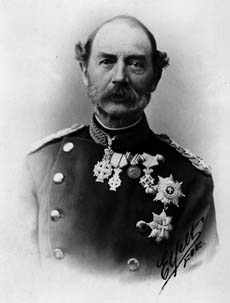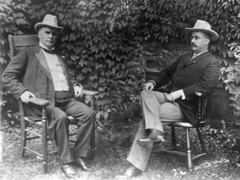The Great War: Neutral Nations 1907
The Neutrals
The United Kingdom of Great Britain and Ireland

Recruitment poster for the expanding British Army
1907
With the outbreak of war in the autumn of 1907 the United Kingdom, the greatest industrial and naval power in Europe, declared its neutrality and watched uneasily on the Entente powers aggression. Great Britain’s policy towards Europe had always been to maintain a balance of power, in other words not letting one country dominate the continent. Imperial France however, with its declaration of war on Prussia, was beginning to challenge this notion.
In a sense, the current disposition of many in Britain was an inversion of their policy 50 years ago. During the Crimean War (1853-1856), the United Kingdom fought with France and the Ottoman Empire against Russia whom they saw as a serious threat to their south Asian possessions. Furthermore, there were several British policy makers at the time who feared that rapidly industrializing Prussia would challenge Britain in a naval arms race. By the early 20th century however, the geo-political situation was very different. Anglo-French relations had been souring for decades as the French Empire had industrialized and expanded at an alarming pace. Russia had also liberalized into a functioning constitutional monarchy and focused its attentions away from British India, two things which greatly improved Russo-British relations.
In short, as 1908 approached anti-Entente sentiments in the United Kingdom were on the rise. Large segments of the British public felt a since of kinship with what they viewed as Protestant Prussia’s heroic stand against Napoleonic aggression. The French blockade of Russia and Prussia in the North Sea was also causing considerable tensions as the Royal Navy was uneasy about France’s presence in its home waters. In light of these developments and the ongoing guerrilla war in the Boer Republics, Britain in late 1907 began to greatly expand its navy and army.
Kingdom of Spain
A deeply conservative monarchy, the Kingdom of Spain at the start of the war favored the largely catholic Entente. The sorry state of the Spanish military and the few foreseeable gains for entering the war however, kept Spain neutral.
Kingdom of Portugal
Following the lead of its chief ally the United Kingdom, Portugal maintained in 1907 a pro-Alliance neutrality.
Kingdom of Belgium
Its independence and perpetual neutrality being guaranteed by the 1839 Treaty of London, Belgium maintains a very strict neutrality in order to stay out of the war.
Kingdom of the Netherlands
An important Prussian trading partner, the Netherlands favors the Alliance but is careful to not upset the French.
Grand Duchy of Luxembourg
Situated dangerously close to some of the most intense fighting of the war, the tiny country of Luxembourg was desperate to stay out of the fighting. Luxembourg however, was unsuccessful in getting other neutral nations such as the United Kingdom, Belgium or the Netherlands in signing a defensive agreement to officially guarantee the small Duchy’s independence.[1]
United Kingdom of Sweden and Norway
Although despite having some irredentist claims against Russia, the United Kingdom of Sweden and Norway favored the Alliance. This was mostly due to Prussia being an important export market for Swedish iron, a commodity that was desperately needed in the Prussian war effort.
Kingdom of Denmark

Christian IX
King of Denmark
Having lost the southern provinces of Schleswig and Holstein to Prussia in 1864, the Kingdom of Denmark resents their powerful southern neighbor. At the start of the war, Napoleon IV offered the return of those provinces if Denmark would enter the war against the Alliance. However, the aging King Christian IX refused the offer, stating that the “current disparity of forces does not lend itself to Denmark joining the war at this time.”
Persian Empire
Having been ruled by the Qajar dynasty since 1794, the Persian Empire deeply resents the encroaching powers of Imperial Russia and Britain. Furthermore having suffered territorial loses to Russia in the 1880’s Persia is seriously contemplating joining the war against the Alliance.
China
Although both the Imperial and Republican factions in China are officially neutral, the ongoing conflict between Russia and Japan in Manchuria has severely strained the already abysmal Sino-Japanese and Sino-Russian relations. Clashes between Chinese elements and Russian and Japanese forces are not uncommon but both sides are two distracted by the Chinese Civil War and the Great War respectively to become heavily engaged.
The United States of America
From the start of the conflict the United States has maintained a firm pro-Alliance stance. The reasons for this are several fold. First, the United States dislikes France’s encroachment in the New World as seen in the Panama Canal and France’s alliances with Brazil and Colombia. Secondly, the United States has an enormous German, Russian, and Italian immigrant community. Thirdly, the constitutional monarchies of the Alliance are perceived to be more democratic than the more authoritarian and imperialistic Entente powers. Finally France, having declared war on Prussia first, is viewed as the aggressor and a warmonger.
Although at the start of the war a clear majority of Americans favored neutrality, the Republican administration or President Robert T. Lincoln began increasing America’s readiness for war. The military buildup of the past few years was accelerated over the objections of the more isolationist Democratic party. Secretary of State McKinley and Secretary of War Roosevelt, both staunch Francophobes, also began making plans to put pressure on France to end the war. Furthermore, thousands of Americans, many of German extraction, joined the von Stueben Brigade to fight against France on the German Front.
Empire of Brazil
France’s most important ally in South America, the Empire of Brazil maintained a decidedly pro-Entente stance towards the war. Although at the start of the war Empress Isabela I turned down a request from Napoleon IV for Brazil to join the war, Brazil continued to provide France with large quantities of raw materials and agricultural products. Both of which were desperately needed for the French war effort.
[1] ITTL there was no Treaty of London (1867), Luxembourg has maintained an uneasy independence based largely on a 1869 bilateral agreement between the French Empire and the Kingdom of Prussia to have Luxembourg serve as a buffer state.
Last edited:

